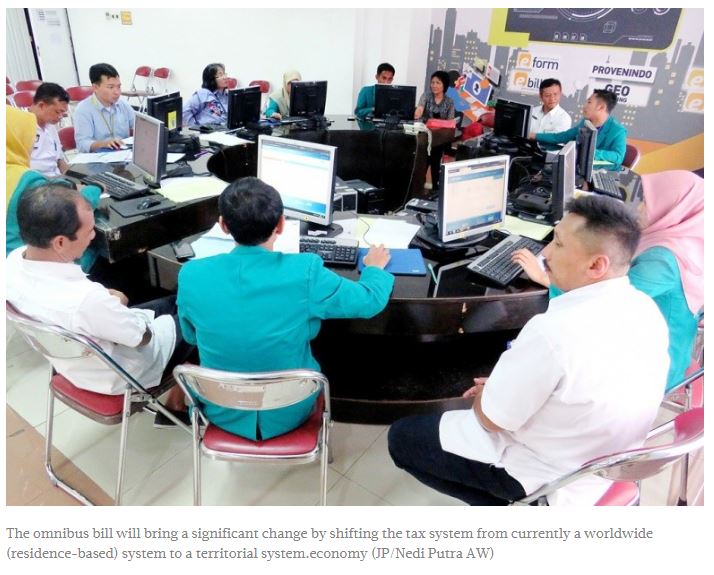Indonesia: 5 things you need to know about omnibus bill on taxation
The upcoming government-initiated landmark bill on taxation is expected to simplify tax regulations and boost investment in Indonesia as it proposes corporate tax cuts and requires internet companies to pay taxes, albeit at the expense of lower tax revenue.
The bill, a draft of which was obtained by The Jakarta Post, will introduce several major changes to the 2008 Income Tax (PPh) Law, the 2009 Value-Added Tax (PPN) Law, the General Taxation System (KUP) Law and the Regional Tax and Fees Law.
These changes aim to deregulate existing tax requirements to create a more open business climate and attract foreign funds as the country’s gross domestic product (GDP) growth cooled at 4.97 percent in the fourth quarter last year amid slowing exports and investment.
The following are among main points of the 29-article bill summarized by the Post.
Corporate income tax cut
The sweeping omnibus bill, if passed into law, will cut corporate income tax to 22 percent in 2021 and 20 percent in 2023 from the current 25 percent.
World Bank acting country director for Indonesia Rolande Pryce said the government’s plan to relax corporate income tax, among other things, would reduce the tax-to-GDP ratio by 0.5 percent.
“Without complementary revenue-raising measures, this will translate to less money being available to close the infrastructure and human capital gaps,” said Pryce on Jan. 30.
Finance Minister Sri Mulyani Indrawati estimated the cut to lower tax revenue by up to Rp 86 trillion (US$6.27 billion) annually.
“Though we’ll cut the corporate tax rate, we will widen our tax base and maximize our spending so there is no economic shock,” Sri Mulyani told reporters recently. “This effort must be maintained because there is a global economic slowdown.”
The gradual cut, however, will allow companies to have more room for expansion, such as by hiring more workers, according to the finance minister.
Publicly listed companies that meet certain criteria will also get an additional 3 percent cut below the general rate, according to the bill’s draft.
Tax for digital companies
Digital companies such as Netflix and Spotify, with a significant economic presence, regardless of where they are based, will be considered permanent establishments and will be subject to local rules.
The significant economic presence will be determined through the companies’ gross circulated product, sales and/or active users in Indonesia.
They will have to charge 10 percent value-added tax on their customers for buying or using their products or services as well as pay income tax to the government. The companies can appoint representatives in Indonesia to collect, pay and report their taxes. Further detailed provisions on the value-added tax will be regulated in a finance ministerial regulation while those of the income tax will be stipulated in a government regulation.
The bill stipulates that if the government cannot declare a digital company a permanent establishment due to the existence of a tax treaty with a certain country, it then will charge an electronic transaction tax on the company’s sales in Indonesia.
Further provisions on the electronic transactions tax will be regulated in a government regulation (PP).
“The bill will expand the tax base, not only for companies with a physical presence but also those that have significant economic presence [in the country] ,” the Finance Ministry’s taxation director general, Suryo Utomo, said.
The bill stipulates further that the communications and information minister can cut the digital companies’ internet access if they do not pay local taxes based on the request of the tax authority, according to the bill.
A Netflix spokesperson told the Post that the company had met with tax authorities in Indonesia over the last few months and that Netflix supported the introduction of a digital tax in Indonesia.

Finance Minister Sri Mulyani teaches six grade students at SD Kenari 01 elementary school in Central Jakarta on Monday, Nov. 11, 2019, about her role as well as the importance of paying tax. (JP/Eisya A. Eloksari)
Government to be given power to overrule regional tax rates
According to the bill’s draft, the government will unify regional taxes and impose fiscal punishments on regional administrations that impose bylaws deemed not in line with the national policy.
The bill will provide the government a legal basis to impose sanctions, namely to delay and/or cut regional transfer amount and/or other sanctions, according to the bill’s draft.
“If a regional administration’s policies are not in line with the national fiscal policy then we will impose sanctions, such as by [cutting] the regional transfer amount or revoking the bylaws,” The Finance Ministry’s fiscal balance director general, Astera Primanto Bhakti, said on Feb. 11. “This will prevent excessive tax collection from businesses by regional administrations.”
Regional Autonomy Watch (KPPOD) executive director Robert Endi Jaweng said of 347 problematic bylaws found by the group’s research, 251 were related to taxation and levies.
“There are a lot of cases in which regional administrations collect so many taxes without providing worthwhile services,” he told the Post over phone interview.
However, the Constitutional Court in 2017 prohibited the central government from annulling regional bylaws and instead gave the authority to the Supreme Court.
Foreign nationals to pay taxes only on income generated in Indonesia
The omnibus bill on taxation will ease tax requirements for expatriates and overseas Indonesians as they would no longer be taxed on income earned outside the country’s borders.
Foreigners who work in Indonesia for more than 183 days a year will be taxed on only the income they earn in Indonesia, while Indonesians working abroad for more than 183 days will be exempt from paying income tax in Indonesia under certain conditions such as their domiciles, place of main activity and tax subject status.
The prevailing Income Tax Law only regulates that individuals, including foreigners, who have resided in Indonesia for more than 183 days within a 12-month period, or resided in Indonesia for a full tax year, are considered a domestic taxpayer. Otherwise, the individual is considered a foreign taxpayer and is not obliged to pay income tax in Indonesia.
Suryo said the new stipulation was meant to provide certainty for foreigners and Indonesian diaspora living abroad. “Only income generated in Indonesia will be subject to tax for foreigners […] Members of the Indonesian diaspora who have been working for more than 183 days abroad will only be subject to taxes abroad.”
Elimination of dividend tax and implementation of lower penalty
The omnibus bill will remove tax on dividends gained from home and abroad as long as they are reinvested in Indonesia, according to the bill’s draft.
It will also remove tax on some income from foreign businesses, including dividends obtained offshore as long as the amount is invested in Indonesia during a certain period of time. The investment could be in the form of expansion, improvements to production capacity and the recruitment of skilled workers.
“We are hoping that through this regulation, the dividend will be distributed to shareholders and the money be used for further investment,” Suryo told reporters recently.
“For investors, this is good news as their investment profits are no longer subject to any income tax,” said Paramadina University researcher Muhamad Ikhsan in an op-ed titled “Indonesia is looking to overhaul its tax system. Here are six important changes you need to know” published by the Post.
Furthermore, the bill will also reduce penalty on late tax payments to a benchmark interest rate determined by the finance minister that is then divided by 12 months. The penalty for missed tax payments, meanwhile, will be calculated based on the benchmark rate plus 5 percentage points and then divided by 12 months.
Penalty for taxpayers who have misstated information in their tax filing is calculated from the interest rate plus 10 percentage points, then divided by 12 months.
The bill’s penalty calculation examples show interest rates of around 0.4 percent per month, far lower than the current penalty rate of 2 percent per month of the amount of unpaid taxes.
Source: https://www.thejakartapost.com/news/2020/02/24/5-things-you-need-to-know-about-omnibus-bill-on-taxation.html


 Thailand
Thailand




